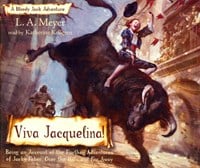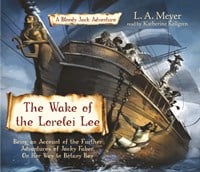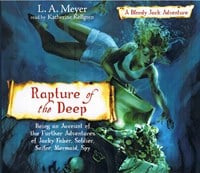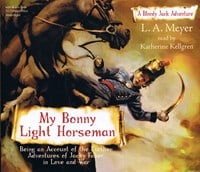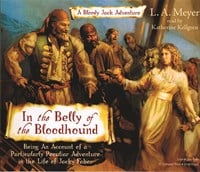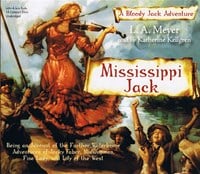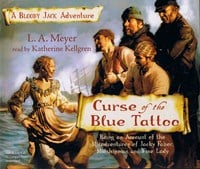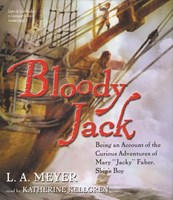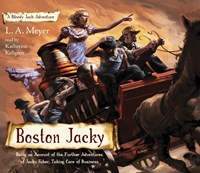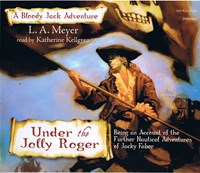Get our Newsletter
-
- Reviews
- Narrators
-
Features
- Audiobook ClubStart a conversation with your book club
- Best Audiobooks2023 Best Audiobooks
- ArticlesDiscover the diverse voices of audiobooks
- NarratorsSpotlight on popular narrators
- AuthorsAuthors talking about their audiobooks
- Upcoming TitlesFind upcoming audiobook release announcements
- Kids and TeensListening selections for kids & teens with age levels
- Audie Awards 2024 Audie Awards
- Subscribe
- About
- Articles
Talking with L.A. Meyer

L.A. Meyer has been a listener for years. Meyer, a visual artist before he turned to writing, spent hours framing prints of his work in his Bar Harbor, Maine, studio. “Those were great listening times because you don’t have to think much when you’re framing.”
In fact, the idea for his popular YA series came from a listening experience. One day, while framing, he tuned into his local independent radio station. They were playing a string of folk songs about girls dressing up as boys to follow their lovers to war or sea. He thought to himself, “Wouldn’t it be great to have a girl who goes off to sea, not to follow a boyfriend, but because she needs to eat?” The result was his feisty female character, Jacky Faber, who disguises herself as a ship’s boy, fleeing the poverty and hunger of London streets to get “three squares” on the navy ship HMS Dolphin. Jacky’s fourth book, MISSISSIPPI JACK, will be coming out this fall, and the first, BLOODY JACK, has just come out in audio.
Meyer listened to many audio stories in those studio hours, and he still listens when he travels or when hours of writing make him print weary. “I think Frank Muller from Recorded Books was an excellent reader.” He’s a fan of mysteries by writers like James Lee Burke, Elmore Leonard, and Stuart Woods. “Listening to David McCullough’s JOHN ADAMS gave me lots of material for my books.”
Part of the success of Meyer’s character, Jacky, comes from the immediacy brought about by his writing in the first person. Meyer’s wonderful ear for the voice of his female character, with her strong Cockney accent, does much to create the story’s mood and setting, as well as its incredible visual images. At the beginning of his creative process, Meyer’s writing is informed by listening. “Once I come up with a character idea, I’m helped by thinking of an actor to wrap the character around. I took the voice of the captain straight from John Cleese’s ‘Monty Python and the Holy Grail.’” He thought of Scout from TO KILL A MOCKINGBIRD when he imagined Jacky. They’re clearly different in accent, Jacky’s voice is Cockney rather than Southern, but their emotional responses are similar.
When BLOODY JACK came out, Meyer listened to it once and then listened to it again. At first, it was strange to hear his written words spoken aloud, but the voice was very close to what he’d imagined. “Katherine Kellgren emotes very well,” he comments. This seems a perfect match for the emotional Jacky Faber, who can fly from fear to kindness in moments.
Did Meyer have any surprises when he listened to the audio? He had a pleasant surprise in how well Katherine Kellgren performs the accents. “I hadn’t realized how difficult this is until I had to do a reading in Portland. I found the accent incredibly difficult to read aloud, so when I heard Kellgren’s reading, I was enthralled.”--Susie Wilde
AUG/SEP 07
© AudioFile 2007, Portland, Maine
Photo © Annetje L. Meyer
The latest audiobook reviews, right in your inbox.
Get our FREE Newsletter and discover a world of audiobooks.





